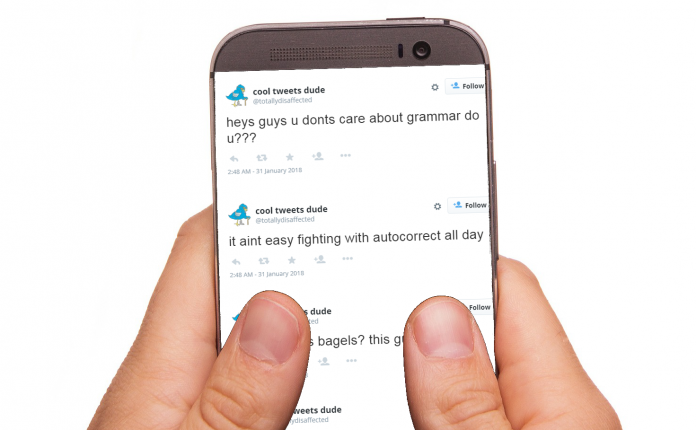While it’s been denounced and maligned as “text speak,” or just plain lazy writing over the past decade or two, the practice of a purposeful flaunting of English’s conventions is as strong as ever — though the reason why may be changing.
You can find people intentionally ignoring everything we were taught about proper writing everywhere. Spelling, capitalization, punctuation, and grammar are frequently ignored or outright misused all over the internet. It’s an easy case to make that this kind of shorthand, including an ever-growing list of abbreviations, came from the era of limited, slow flip phone texting. But that doesn’t explain why they’ve stuck around. Nearly everyone who communicates electronically these days does it from either a smartphone, a tablet, or a computer. With built-in spell checking, autocorrect, and predictive text, it’s easier than ever to follow the rules, and often harder than ever to break them.
For the many of us who identify as either current or perhaps recovering grammar sticklers, this can be a touchy issue. Once you’ve gone through all the trouble of learning and perfecting the rules (as much as anyone can perfect an understanding of the English language), it can be off-putting to see those rules thrown to the wayside. In certain contexts there is absolutely a place for those rules — say, a newspaper — but in casual conversation, where shorthands just accelerate the speed of conversation, is it truly harmful to the language?
Let’s look at an example: the word “what.” It’s widely acceptable to use it as a spoken exclamation of surprise or disbelief, and while it’s also used as a way to ask someone to repeat themselves, the context generally makes it clear whether it’s rhetorical or not. Online, though, the phrase is more ambiguous in it’s meaning. Imagine you send your friend a text telling them that somebody had just walked up to you on the street and called you a “rancid turnip.” They could respond with just that one word, but how they write it matters.
If they say “What?” you might assume they’re confused or angry about it, but it’s unclear.
If they say “what??????” then it emphasizes the shock.
If they say “wat” or “wut” with no punctuation, then it’s clearly a reaction to the absurdity of the insult, and the strangeness of the situation.
The third option is the quickest, and most efficient to write (disregarding potential autocorrect issues), and conveys the clearest meaning, despite being the most egregiously “wrong.” The first two could have their tone easily enhanced with an emoji, which is another valuable part of language that’s quickly becoming pivotal to shorthand communication, but that’s a topic for another day.
Even in messages longer than one word (or perhaps especially so), these rule “violations” are incredibly valuable. Imagine you saw a tweet from your friend that read “Oh god, I’m so excited about the new Star Wars, you don’t even know.” It’s probably genuine, if a bit understated. Compare that to “oh god, im so excited about the new star wars, you dont even know,” which comes across as sarcastic and detached, or “OhgodI’msoexcitedforthenewStarWarsyoudon’tevenknow,” which tells you they’re practically overwhelmed with authentic anticipation.
You’ll hear all the time that language is a growing, changing thing, usually in response to people complaining that the word “selfie” got added to a dictionary, or that “literally” doesn’t mean “literally” anymore. But it applies to writing, too. Electronic communication is developing it’s own dialect, its own unique subset of the English language, and it’s one that’s tailored to the medium it’s transmitted across.
Just like regional slang might shorten words important to the region (would someone visiting the area have any idea who/what/where PoCo was?), these visual, written cues have a place in our way of communing. Just like contractions and abbreviations make it easier to speak and write without massively elongating every sentence (“I will be there as soon as possible” vs. “I’ll be there ASAP”), these emerging signifers of tone cut the excess from language when it isn’t needed, and focus in on the point of language: to convey a message, and have it understood by the reader.
And if you know that your reader will understand your tone of voice when you reply to them with “wat,” then you should go right ahead and do it.
Image: Jeff Mijo/The Cascade
Jeff was The Cascade's Editor in Chief for the latter half of 2022, having previously served as Digital Media Manager, Culture & Events Editor, and Opinion Editor. One time he held all three of those positions for a month, and he's not sure how he survived that. He started at The Cascade in 2016.



